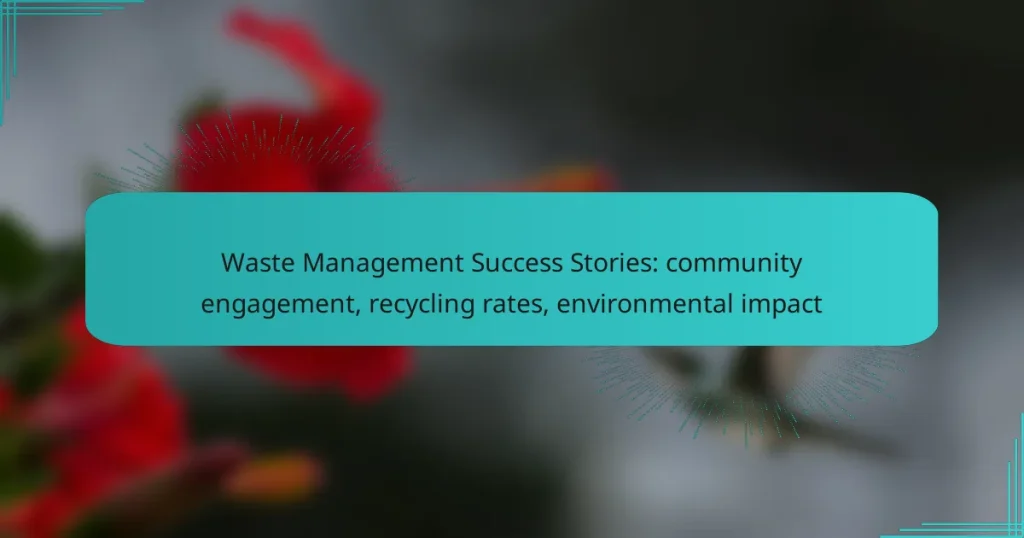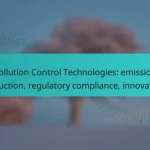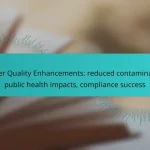Effective waste management is essential for creating sustainable communities, and it thrives on active community engagement. By fostering awareness and participation in recycling initiatives, residents can significantly improve recycling rates and reduce landfill waste. This collective effort not only enhances environmental health but also conserves natural resources, paving the way for a cleaner, greener future.
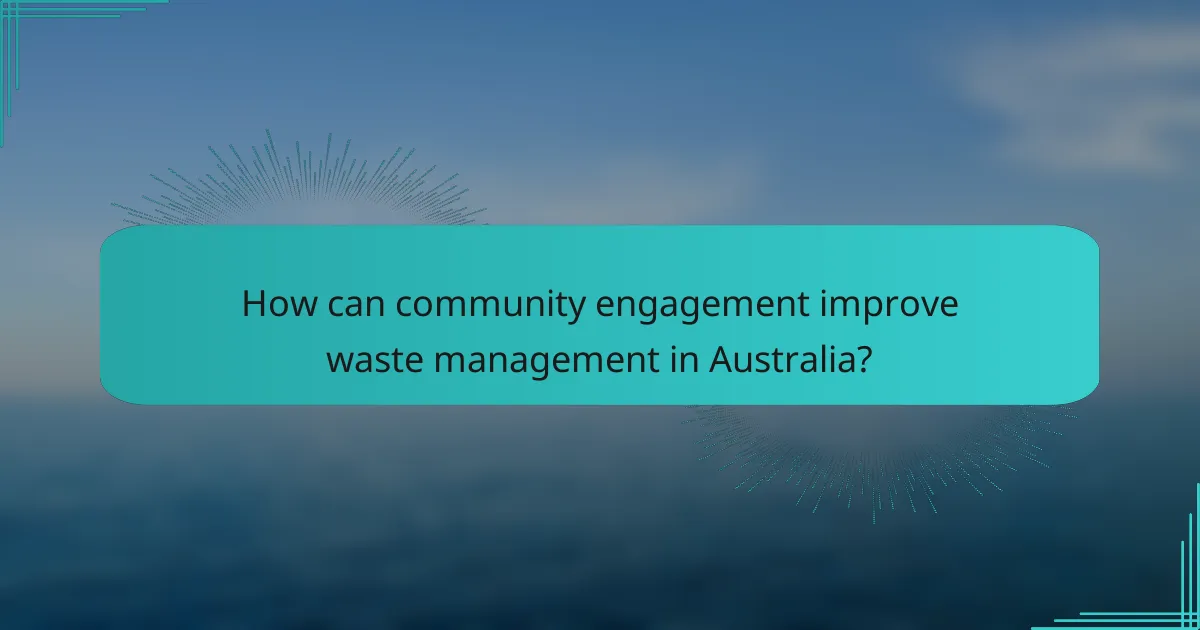
How can community engagement improve waste management in Australia?
Community engagement plays a crucial role in enhancing waste management in Australia by fostering awareness and encouraging participation in recycling and waste reduction initiatives. When residents are actively involved, they are more likely to adopt sustainable practices, leading to higher recycling rates and reduced landfill waste.
Successful community programs
Effective community programs often include educational campaigns, local clean-up events, and recycling workshops. These initiatives help residents understand the importance of proper waste disposal and recycling, while also building a sense of community responsibility. For example, programs that offer incentives for recycling can significantly boost participation rates.
Collaboration with local schools and businesses can amplify these efforts, creating a network of support for sustainable practices. Engaging local leaders and influencers can also enhance visibility and credibility, making it easier to reach a broader audience.
Case studies from Sydney
Sydney has implemented several successful community engagement initiatives that have positively impacted waste management. One notable example is the “Love Your Waste” campaign, which focuses on educating residents about waste sorting and recycling. This campaign has led to increased awareness and participation in recycling programs across the city.
Another case study involves the City of Sydney’s “Waste Less, Recycle More” initiative, which has resulted in significant improvements in recycling rates. By providing residents with clear guidelines and resources, the program has effectively reduced contamination in recycling bins, enhancing overall efficiency.
Impact of local initiatives
Local initiatives have a measurable impact on waste management outcomes. Communities that actively participate in waste reduction programs often see recycling rates increase by significant margins, sometimes reaching up to 50% or more. These initiatives not only reduce landfill waste but also promote environmental stewardship among residents.
Moreover, the environmental benefits extend beyond waste reduction; engaging communities in sustainable practices can lead to improved local ecosystems and reduced carbon footprints. For instance, tree planting events associated with waste management programs can enhance biodiversity while fostering community pride.

What are the recycling rates in Australian cities?
Recycling rates in Australian cities vary significantly, with some urban areas achieving impressive figures while others lag behind. Generally, cities like Melbourne and Sydney have reported recycling rates in the range of 40% to 60%, reflecting ongoing efforts to improve waste management practices.
Recycling statistics in Melbourne
Melbourne has made notable strides in recycling, with recent reports indicating a recycling rate of approximately 50%. This success is attributed to comprehensive public education campaigns and the availability of convenient recycling services for residents.
The city has implemented a four-bin system, which includes separate bins for general waste, recyclables, organics, and hard waste. This system encourages proper sorting and has contributed to higher recycling rates.
Comparison of recycling rates
When comparing recycling rates across major Australian cities, Melbourne’s 50% rate stands out against Sydney’s rate of around 40% and Brisbane’s approximately 45%. These differences highlight the varying effectiveness of local waste management strategies and community engagement initiatives.
Factors such as population density, local policies, and community involvement play a crucial role in these statistics. For instance, cities with robust recycling programs and active community participation tend to report higher rates.
Factors influencing recycling success
Several key factors influence the success of recycling initiatives in Australian cities. Public awareness and education are essential, as informed residents are more likely to participate in recycling programs effectively.
Additionally, the accessibility of recycling facilities and clear guidelines on what can be recycled significantly impact participation rates. Cities that invest in infrastructure and provide straightforward information tend to see better outcomes.
Lastly, local government policies, including incentives for recycling and penalties for contamination, can motivate residents to engage more actively in recycling efforts. Collaboration between local authorities and communities is vital for sustained success in waste management.
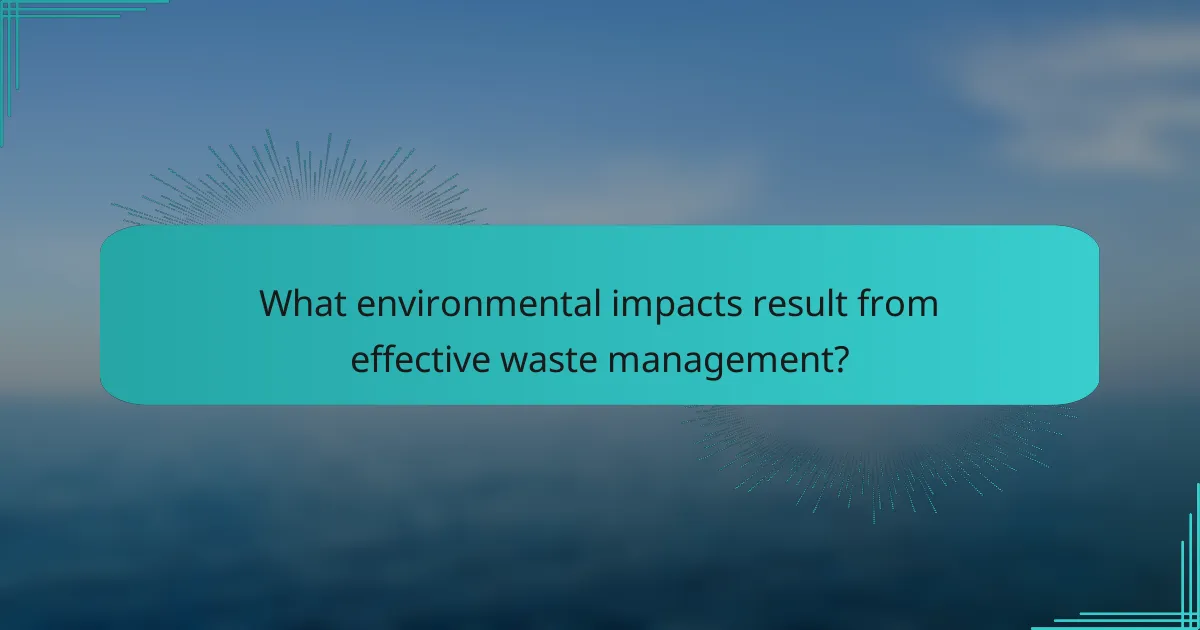
What environmental impacts result from effective waste management?
Effective waste management significantly reduces pollution and conserves natural resources, leading to a healthier environment. By implementing strategies such as recycling and community engagement, communities can minimize waste and its negative effects on air, water, and land.
Reduction in landfill waste
Effective waste management practices, such as recycling and composting, can substantially decrease the volume of waste sent to landfills. Communities that actively engage in these practices often see landfill waste reduced by 30-50% over time. This reduction not only prolongs the lifespan of existing landfills but also minimizes the need for new landfill sites.
To achieve significant reductions, local governments can implement curbside recycling programs and provide educational resources to residents about proper waste sorting. Encouraging businesses to adopt zero-waste initiatives can further enhance these efforts.
Improvement in air quality
Effective waste management can lead to improved air quality by reducing harmful emissions from landfills and waste incineration. When organic waste decomposes in landfills, it produces methane, a potent greenhouse gas. By diverting organic materials from landfills through composting, communities can lower methane emissions and enhance overall air quality.
Additionally, reducing waste transportation distances through localized recycling programs can decrease vehicle emissions. Implementing these strategies can lead to noticeable improvements in air quality, benefiting public health and reducing respiratory issues in the community.
Benefits to local ecosystems
Proper waste management protects local ecosystems by minimizing pollution and conserving natural habitats. When waste is disposed of responsibly, it reduces the risk of contaminating soil and water sources, which is crucial for maintaining biodiversity. Healthy ecosystems are vital for supporting wildlife and providing essential services such as clean water and air.
Communities can further enhance these benefits by organizing clean-up events and promoting the use of biodegradable materials. Engaging residents in stewardship programs fosters a sense of responsibility towards the environment, encouraging sustainable practices that benefit local ecosystems.

What frameworks support successful waste management initiatives?
Successful waste management initiatives rely on a combination of government policies, community engagement, and partnerships with organizations. These frameworks create a structured approach to improving recycling rates and minimizing environmental impacts.
Government policies in Australia
In Australia, government policies play a crucial role in shaping waste management practices. Regulations such as the National Waste Policy aim to reduce waste generation and increase recycling rates across states and territories. Local councils often implement specific initiatives aligned with these policies, such as curbside recycling programs and waste education campaigns.
For effective waste management, it is essential for local governments to engage with communities to promote compliance and awareness. Initiatives like container deposit schemes encourage residents to return bottles and cans for a refund, significantly boosting recycling participation.
Partnerships with NGOs
Partnerships with non-governmental organizations (NGOs) enhance waste management efforts by leveraging expertise and resources. NGOs often focus on education and advocacy, helping communities understand the importance of recycling and waste reduction. Collaborations can lead to innovative programs that address specific local challenges.
For instance, initiatives like Clean Up Australia Day mobilize volunteers and raise awareness about littering and waste disposal. These partnerships can also facilitate the development of community gardens and composting programs, further promoting sustainable waste practices.
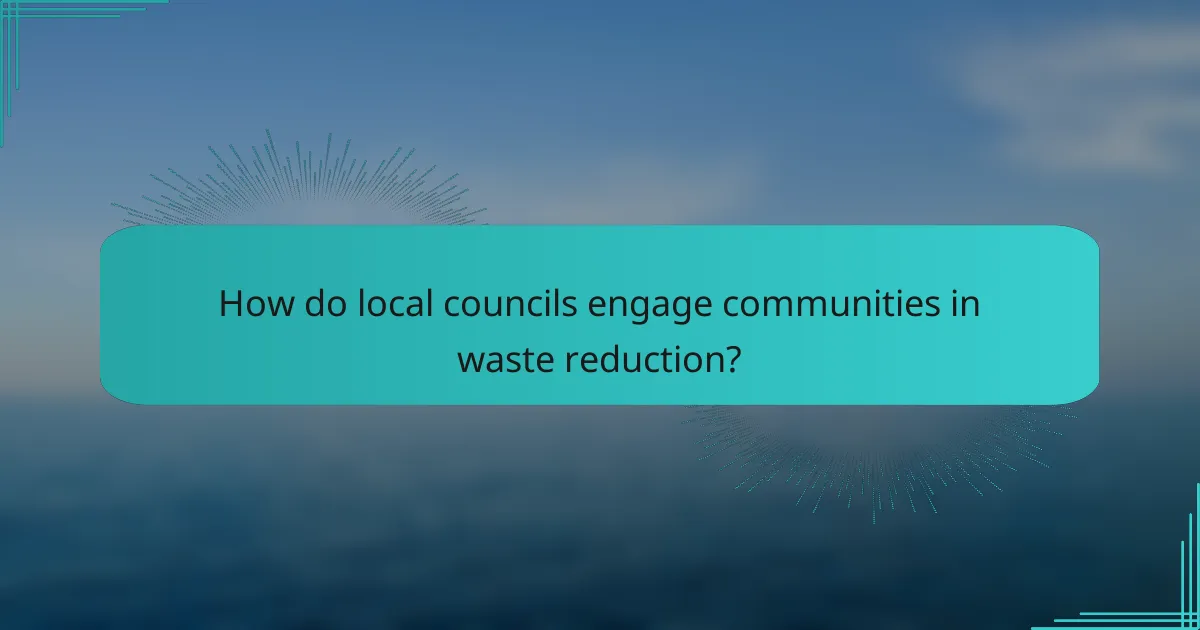
How do local councils engage communities in waste reduction?
Local councils engage communities in waste reduction through various initiatives aimed at raising awareness and promoting active participation. These efforts often include educational programs, incentives for recycling, and community events that foster a culture of sustainability.
Education programs in Brisbane
Brisbane has implemented several education programs designed to inform residents about waste reduction practices. These programs often include workshops, school presentations, and community events that teach residents how to recycle effectively and reduce waste at home.
For example, the “Waste Wise Schools” initiative encourages schools to adopt sustainable practices, integrating waste education into the curriculum. This not only raises awareness among students but also engages families in waste reduction efforts.
Incentives for participation
Incentives play a crucial role in encouraging community participation in waste reduction initiatives. Local councils often provide rewards for residents who actively engage in recycling and waste reduction, such as discounts on waste collection fees or entry into prize draws.
Brisbane’s “Green Waste Collection” program offers residents free green waste bins, promoting composting and reducing landfill contributions. Such incentives not only motivate participation but also create a sense of community responsibility towards waste management.

What emerging trends are shaping waste management in Australia?
Emerging trends in waste management in Australia focus on increasing community engagement, improving recycling rates, and minimizing environmental impact. These trends are driven by innovative practices, public awareness campaigns, and regulatory changes aimed at fostering sustainable waste management solutions.
Community engagement in waste management
Community engagement plays a crucial role in effective waste management in Australia. Local governments and organizations are increasingly involving residents in recycling programs and waste reduction initiatives through educational campaigns and participatory events.
For instance, initiatives like community clean-up days and workshops on composting not only raise awareness but also encourage residents to take ownership of their waste. Engaging the community fosters a sense of responsibility and can lead to higher participation rates in recycling programs.
Recycling rates and innovations
Recycling rates in Australia have seen significant improvements due to innovative approaches and technologies. Many local councils are adopting advanced sorting technologies and expanding their recycling facilities to handle a wider range of materials.
Programs such as the Container Deposit Scheme encourage individuals to return drink containers for a small refund, which has proven effective in boosting recycling rates. Additionally, public education on proper recycling practices helps reduce contamination, further enhancing the efficiency of recycling systems.
Environmental impact and sustainability
The environmental impact of waste management practices is increasingly being prioritized in Australia. Efforts to reduce landfill waste and promote circular economy principles are gaining traction, with a focus on minimizing resource consumption and maximizing reuse.
For example, initiatives aimed at reducing single-use plastics and promoting biodegradable alternatives are becoming more common. These measures not only help protect the environment but also align with national goals to reduce greenhouse gas emissions and promote sustainability.
